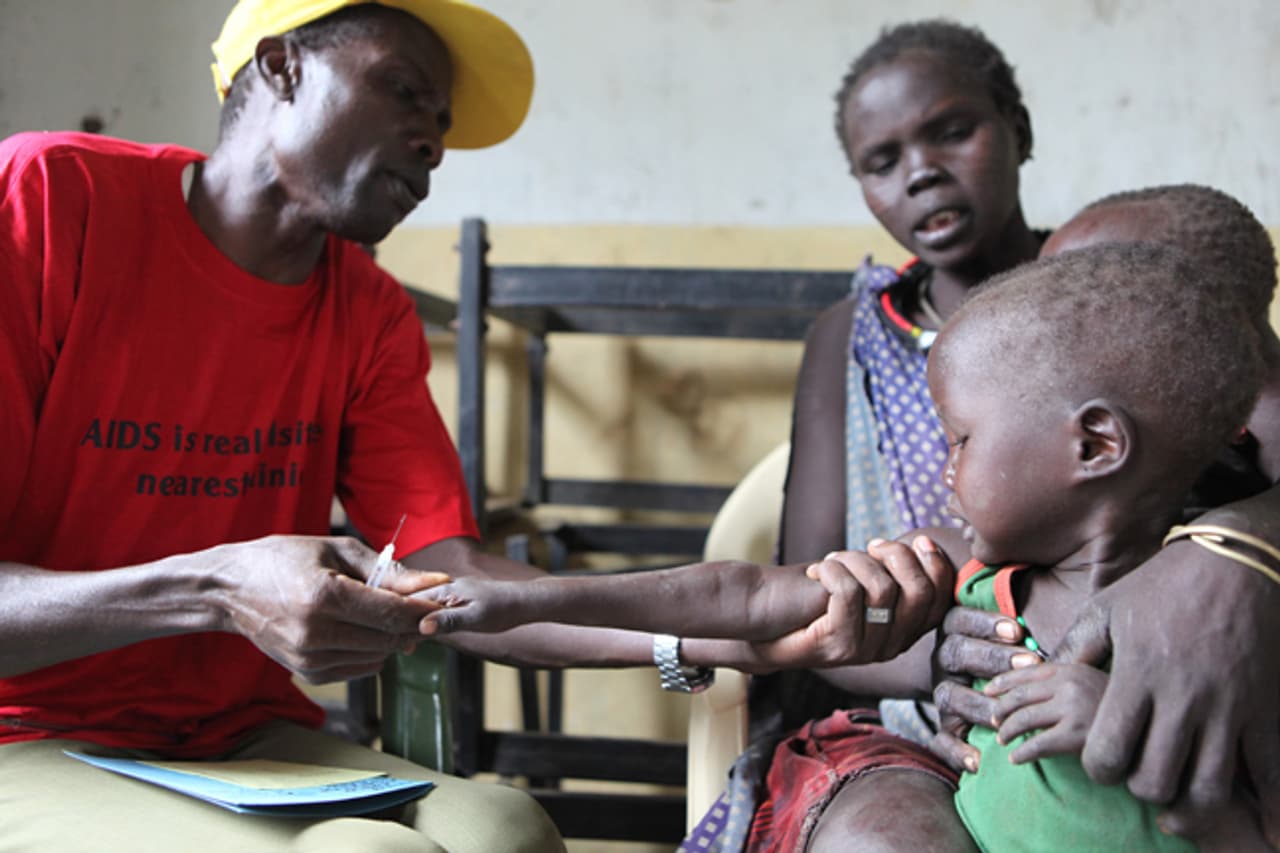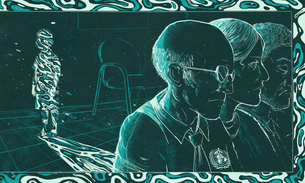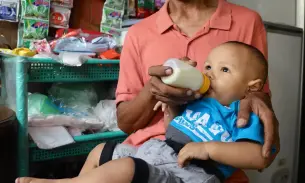
UN criticised in Sudan after children left unimmunised
One of the lucky ones: Save the Children’s vaccination programme in Southern Sudan
NGOs and medical teams are deeply concerned that vaccinations from common childhood diseases are not getting to thousands of vulnerable young children who have fled to the Nuba mountains in Sudan.
The few doctors left working in the area are critical of the UN after vaccine supplies dried up nearly a year ago. They now fear the largely refugee community are at severe risk of outbreaks of infectious diseases, including measles, which could prove devastating to the vulnerable population, particularly malnourished young children.
Over a million desperate people have fled to the Nuba mountains after a rise in violence and chaos along the border of the newly created South Sudan. But the area has provided little safety. It is being held by the Sudan People’s Liberation Army and as a result is under constant bombardment from aerial bomb attacks from the Sudanese government.
President Omar al-Bashir has banned all UN agencies from operating in the area, except under specific exceptions.
Those exceptions have been limited meaning UN agencies, usually tasked with supplying food and medical supplies, have faced severe restrictions.
According to UNICEF they have managed to carry out only one vaccination campaign in the area, since June 2011. The children’s agency says the polio campaign reached 1,700 children under 5 years old in a few, limited areas of the Nuba mountains under the control of the SPLM-N rebel forces. They had aimed to reach 4,000.
The UN agency also claim they managed to transfer 1,500 polio doses to the area but admit those supplies have long since run out.
However doctors on the ground reject UNICEF’s claims saying that the last vaccines they received from the official UN agency in August were unusable, after being exposed to sunlight and heat when the box of vaccines had been opened by security forces in Kadugli, the province’s capital.
In situations like this about 20% of children with measles may die and survivors may be disfigured, or may be left blind, both common complications in severely malnourished children.
Tim O’Dempsey of the Liverpool School of Tropical Medicine.
Dr Alamin Osman is director general of the Secretariat of Health for the region and the only qualified Sudanese doctor working in the area. ‘I can confirm the last vaccines received in good condition were before war,’ he said. ‘UNICEF in Sudan must answer to the world why they allowed Sudan security to mishandle those items they claim to have sent to Kauda,’ he added.
Responding to Dr Osman’s claims UNICEF told the Bureau, ‘The inspector opened the lid very briefly and only to confirm that they were indeed vaccines contained in the box. Adequate cold chain was in place.’
Dr Osman is worried a health disaster could be on the way. He has limited supplies and ran out of vaccines a long time ago. ‘There are reported cases of measles but I am not in a position to do any thing,’ he said.
According to experts an outbreak of measles could prove devastating to a population already weakened by hunger and upheaval.
Tim O’Dempsey of the Liverpool School of Tropical Medicine explained ‘measles can spread rapidly, particularly in situations of overcrowding. In situations like this about 20% of children with measles may die and survivors may be disfigured, or may be left blind, both common complications in severely malnourished children.’
Aidan Hartley of Channel 4 Television’s Unreported World recently got rare access to the region, shepherded through by rebel soldiers. He was shocked at what he saw. ‘I saw rural clinics where the only medicines were ones captured from the SAF government forces or herbs or salt and water, it was medieval. Thousands are going to die in Nuba,’ he said. ‘Deaths could be avoided if there were vaccines, emergency relief, basic drugs and food. But there aren’t.’
George Clooney has also visited the region, promptly returning to the US to get himself arrested on the Sudanese embassy steps in protest. Shocked by what he saw happening in Nuba he co-founded the Satellite Sentinel Project with activist John Prendergast.
I saw rural clinics where the only medicines were ones captured from the SAF government forces or herbs or salt and water, it was medieval. Thousands are going to die in Nuba.
Aidan Hartley, journalist with Unreported World
Prendergast told the Bureau, ‘When the Khartoum government uses starvation as a war tactic by denying access to humanitarian organizations, there are other quiet killers that often end up being more deadly than starvation itself. In famines, health crises usually take more lives than hunger. If kids can’t be vaccinated, against some of the deadliest diseases in the world, then the crisis that is unfolding in the Nuba Mountains right now could be even worse than the worst-case scenarios.’
A few smaller NGOs, such as the Irish charity Trócaire are managing to get limited supplies in to the region’s only hospital, but this trickle does not come close to requirements.
Dr Tom Catena, a US missionary and the only trained surgeon in Nuba, told the Bureau. ‘We’ve had no resupply of vaccines since they ran out several months ago although we’ve been trying to get some but to no avail. The only vaccines we’ve gotten are the tetanus toxoid which was bought in Nairobi and sent out to us by the diocese.’
Ahmed A. Saeed, a humanitarian aid worker with a coalition of groups in the area, said: ‘Only through a consensual access that is negotiated by the parties and internationally supported assistance on a large scale will meet the needs.
‘I am expecting the UN to be pushing for unimpeded humanitarian access to all affected areas rather than justifying their tamed and limited presence in Kadugli by claiming access to SPLM-N held areas,’ he added.
UNICEF and other UN agencies need permission from al-Bashir to operate in the country. Negotiations with Khartoum are ongoing.
Cut off from the outside world and with supply routes strangled by restrictions from the Sudanese government, the people of Nuba are in a precarious position.
Experts recommend that all children between six months and fifteen years should be immunised against measles. Campaigns lead by UNICEF and the WHO would normally vaccinate against a range of infectious diseases, including measles, polio, tetanus, TB, diphtheria and whooping cough.
The rains are coming in Sudan, and with them the access roads to the region will become even more impassable. Meanwhile, as disease spreads and children are left vaccinated, medics fear a health disaster is just around the corner.
Support Trocaire’s work here.
Sign up for email alerts from the Bureau here.
A version of this story was published in the Observer.
Note: this article contains a correction. Mssrs. Clooney and Prendergast co-founded the Satellite Sentinel Project, not the Enough Project as previously stated. Mr. Prendergast co-founded the Enough Project with Ms. Gayle Smith.




